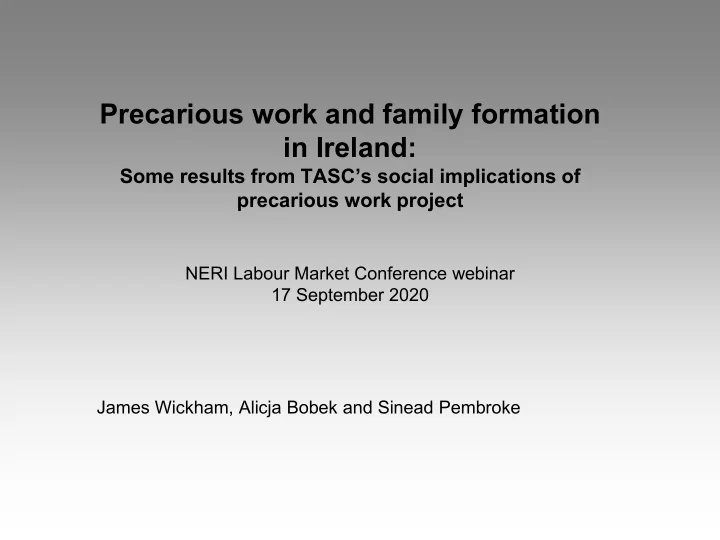

Precarious work and family formation in Ireland: Some results from TASC’s social implications of precarious work project NERI Labour Market Conference webinar 17 September 2020 James Wickham, Alicja Bobek and Sinead Pembroke
Social implications of precarious work project Key starting point: Unbundle ‘precarity’ Key hypotheses: Impact of precarious employment moderated by welfare state Experience of precarious employment moderated by household/life-course context
Defining precarious work
Sampling matrix Basic hypotheses: (1) How precarious work is experienced depends partly on household context (2) Social implications of precarious work depend partly on welfare state (housing, health, demography)
Education and atypical work: Ireland
Temporary work and education Childcare sector Third level English language schools
Transformation of the service class Traditional sociological class schema » Goldthorpe: ‘Service class’ defined by offering service not work But » commodification and metrification » Collapse of bureaucratic hierarchies » Temporary work culmination of this
Wanting a proper job I had a relatively short interview with the assistant director of studies and I was told that there was a class next week that they would like covered as someone was on holiday. And I didn’t have a contract. Then eventually, I think I ended up after about a month, they said, ‘well look, we have a new cycle of classes opening and we’d like to hire you permanently.’ Well it wasn’t permanently – they give you a three-month trial contract. Then, at the end of that, I got to sign a year-long. So it’s year- long rolling contracts; that is how it works there... Andrew, temporary contract English language teacher
Employment and fertility Earlier arguments: » Smaller families, postponed parenthood, childlessness – all seen as life-style decision (e.g. Miller 2005) » BUT Europe’s baby deficit (Bernardi (2005) Labour market as cause » Unemployment / uncertainty » Southern Europe Role of welfare state » France vs Italy (Pailhe & Solaz 2012)
Terror of the biological clock My cousin is a year younger than me, she already has a child, she is trying to have a second child; she was getting IVF for years and she still hasn’t got pregnant. So I know from around me and from my family [that] it is very difficult to do that, and yet I think after two years, by the time I’m 37, I just think I probably won’t be able to even – I don’t know if I can now – I’ve never been able to consider it. But it’s just really challenging because I don’t know where I’m going to be in two years’ time, and I don’t know – if things continue the way they are job wise it means I won’t be able to have a child (Barbara)
And paternity… And I suppose these extra securities that I think are essential, are a part of the motivation for getting out of the TEFL industry because I would consider a pension, and health insurance, and life insurance as fundamental aspects of a stable household. Again, my wife is very clear that there is going to be no family situation until we’re properly settled. (…) So essentially, I feel… Well, I do have to, if I want to start a family, I have to have a job that has a contract and that pays enough to have a good quality of life and have these securities. That’s the basis for me starting a family. (Michael) 33, English language teacher)
Conclusion: imposed precarity Management consultancy arguments that young people want flexibility. BUT aspiration for a ‘proper job’ still widespread. Proper job often seen as precondition for children especially in lower service class Feed back loops between precarity and household context
Recommend
More recommend